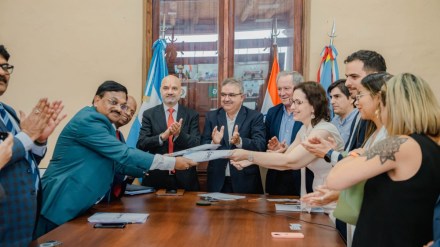In a significant move to bolster energy relations between South American nation Argentina and India, YPF, Argentina’s state-owned energy company, has signed a Memorandum of Understanding (MoU) with three major Indian firms—Oil and Natural Gas Corporation (OIL), Gas Authority of India Limited (GAIL), and Oil and Natural Gas Corporation Videsh Limited (OVL). This partnership aims to facilitate the export of liquefied natural gas (LNG) from Argentina to India, with an ambitious target of up to 10 million tons per year (MTPA), which is equivalent to 47 million cubic meters per day, roughly 30% of Argentina’s current natural gas production.
A Game-Changing LNG Agreement
The 10 MTPA LNG agreement marks a new chapter in energy cooperation between the two countries. YPF and its strategic partner Petronas are spearheading a massive LNG project centered around the Vaca Muerta shale gas reserves, one of the world’s largest unconventional gas formations. Located on the east coast of Argentina, around 600 kilometers from the Vaca Muerta formation, this project is set to produce 30 million tons of LNG annually, placing it among the largest LNG initiatives globally. The first exports are expected to begin by 2029, with an onshore terminal to follow by 2031.
Horacio Marín, YPF’s President and CEO, stressed the significance of India’s role in the project, explaining, “This project is project finance. You cannot finance yourself because the quantity of money you have to invest in the LNG plant is huge for any company.” He emphasized that deals with major international buyers, such as India, are essential to secure the required financing to bring this large-scale project to life.
India: A Critical Market for Argentina’s Energy Future
India’s growing energy needs and efforts to diversify its energy sources make it a crucial partner for Argentina’s LNG exports. In an exclusive conversation earlier with FinancialExpress.com, Marín underscored India’s importance in Argentina’s energy strategy. “India will be the engine of the world in the next decade… This project is about more than just small buyers; it’s about building a long-term relationship,” Marín said.
YPF views India not only as a buyer but also as a key partner in its broader energy strategy. “We are convinced that the country has an opportunity to become an energy exporter and achieve the industry-wide goal of generating $30 billion in revenue over the next 10 years,” Marín added in his conversation.
The Vaca Muerta Shale Gas and LNG Project
YPF’s Vaca Muerta shale gas reserves have been at the heart of the company’s energy plans. Marin explained that five years ago, the necessary infrastructure, legal framework, and financial stability were lacking to realize the full potential of Vaca Muerta. “Five years ago, Vaca Muerta was just beginning,” he said. “At that time, we didn’t have the legal framework, the infrastructure, or the financial stability to support such a large-scale project.”
With the improved economic and political landscape, Argentina is now primed to become a major energy exporter. The involvement of India in the LNG agreement is seen as a turning point, signalling a renewed commitment to growing the energy sector.
Expanding Beyond LNG: Lithium and Critical Minerals Cooperation
In addition to LNG, the MoU also includes significant cooperation in lithium and other critical minerals—resources that are essential to the transition to renewable energy and the production of electric vehicles. Argentina holds 67% of the world’s proven lithium reserves, making it a key player in the global lithium market, a central element in India’s push towards electric mobility and renewable energy.
As reported previously by FinancialExpress.com in 2024, Argentina’s Lithium Triangle, spans Argentina, Chile, and Bolivia, offers an abundant supply of the precious mineral. This region’s lithium reserves are critical to meeting the growing demand for battery storage solutions for solar power plants and electric vehicles.
Indian mining companies have already begun exploring lithium in Argentina’s Catamarca province, and with the new MoU, these collaborations are set to expand. Marín emphasized the strategic importance of India’s role in securing a steady supply of lithium for its future energy needs, saying, “There is a good relationship between Argentina and India, and this project is about more than just small buyers; it’s about building a long-term relationship.”
Strengthening Bilateral Relations
This MoU comes amid deepening diplomatic ties between Argentina and India. Argentina’s Foreign Minister, Diana Mondino, led a high-profile delegation to India in October 2024, underscoring the importance of strengthening bilateral cooperation in energy, agriculture, and minerals. During this visit, discussions focused on Argentina’s critical role in India’s energy security and the increasing importance of lithium in trade.
The signing of the MoU with YPF , which took place in New Delhi, was witnessed by senior officials from both countries, including Hardeep Singh Puri, India’s Minister of Petroleum and Natural Gas.
Future Prospects: A Collaborative Approach to Clean Energy
As Argentina positions itself as a leader in renewable energy and electric vehicle infrastructure, this MoU with India is a step toward ensuring both nations secure the critical resources needed for their energy transitions. The partnership is expected to drive forward technological innovation, particularly in the fields of lithium extraction, battery production, and green hydrogen.
Marín expressed confidence in the partnership’s long-term impact, noting, “This is not just a project about LNG; it’s about a long-term strategic relationship with India, helping both countries meet their energy and sustainability goals.”
